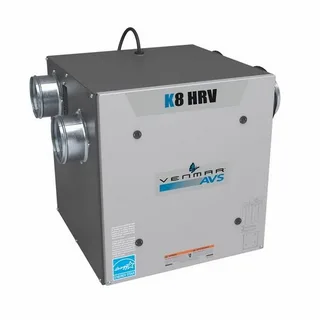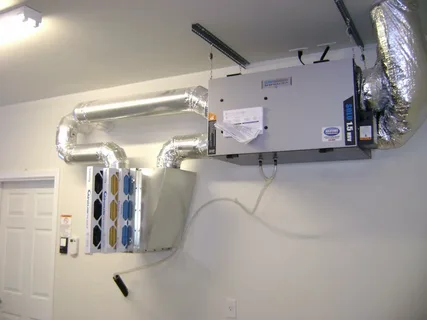Are you looking for a way to take control of your home’s temperature? Heat-On offers the perfect solution: a high-quality HVAC system. With this system, you can ensure your house is kept at the optimal temperature all year round. The system also includes a heat recovery system, which can help reduce energy costs while keeping you comfortable. HVAC-systems are easy to install and maintain, and they come with a comprehensive warranty to ensure that you have peace of mind. So, if you’re ready to take control of your home’s temperature, check out HVAC-systems today!
What Is an HVAC-system?
An HVAC-system, or heating, ventilation, and air conditioning system, is a centralized system that controls the temperature, humidity, and air quality in your home. It comprises various components, including a furnace or heat pump, air conditioner, air handler, ductwork, and thermostat.
- The primary function of an HVAC-system is to provide thermal comfort and maintain indoor air quality. It allows you to control your home’s temperature and humidity levels, ensuring that you stay comfortable regardless of the weather outside.
- HVAC-systems offer several benefits, including energy efficiency, improved air quality, and precise temperature control. They can also help reduce your home’s allergens, pollutants, and odors, promoting a healthier living environment.
- Different types of HVAC-systems are available, such as split, packaged, and ductless systems. Each type has its advantages and is suitable for different home configurations.
Overall, an HVAC-system is an essential investment for any homeowner, providing optimal comfort and convenience throughout the year. With its advanced features and technology, you can enjoy a pleasant and controlled indoor environment regardless of the weather outside.
Benefits of Installing an HVAC-system
Installing an HVAC-system in your home comes with a multitude of benefits.
- First and foremost, it provides optimal comfort throughout the year. With the ability to control the temperature and humidity levels, you can create the perfect indoor environment no matter what the weather is like outside.
- Another major advantage of an HVAC-system is its energy efficiency. These systems are designed to consume less energy while maintaining the desired temperature, helping you save on energy bills.
- Additionally, HVAC-systems improve the air quality in your home by filtering out allergens, pollutants, and odors, creating a healthier living space for you and your family.
- Moreover, HVAC-systems offer precise temperature control, allowing you to set your preferred temperature easily. This eliminates the need for constant adjustments and ensures consistent comfort.
Overall, installing an HVAC-system is a smart investment that enhances your home’s comfort and improves its energy efficiency and indoor air quality.
Types of HVAC-systems Available
Regarding HVAC-systems, various types are available to suit different home configurations and preferences. Here are five types of HVAC-systems that you can consider for your home:
Split Systems
This is the most common type of HVAC-system, where the components are divided into two units. The outdoor unit houses the compressor and condenser, while the indoor unit contains the evaporator coil and blower. Split systems are versatile and can be installed in various types of homes.
Packaged Systems
Unlike split systems, packaged systems house all the components in a single unit. These systems are typically installed outdoors and are suitable for homes with limited indoor space. Packaged systems are available in different configurations, such as gas-electric, heat pump, or dual-fuel, to accommodate different heating and cooling needs.
Ductless Systems
As the name suggests, ductless systems do not require ductwork for air distribution. Instead, they use individual indoor units installed in different zones or rooms. This allows for greater flexibility and control over temperature settings in different areas of your home.
Geothermal Systems
Geothermal HVAC-systems utilize the earth’s natural heat to heat and cool. These systems extract heat from the ground during the winter and dissipate heat into the ground during the summer. Geothermal systems are highly efficient and environmentally friendly but require a significant initial investment.
Hybrid Systems
Hybrid HVAC-systems combine a traditional furnace or boiler with a heat pump. The system automatically switches between the two based on outdoor temperature and energy efficiency. This allows for optimal comfort and energy savings, especially in fluctuating temperatures.
 How Does A Heat Recovery Ventilation (HRV) System Work?
How Does A Heat Recovery Ventilation (HRV) System Work?
A heat recovery ventilation (HRV) system uses a heat exchanger to transfer heat from the outgoing stale air to the incoming fresh air. This allows you to maintain a comfortable indoor temperature while improving energy efficiency.
Here’s how it works:
- The HRV-system extracts stale air from your home through ducts and vents.
- As the air is extracted, the heat exchanger captures the heat from the outgoing air.
- Simultaneously, fresh air from outside is drawn into the system through another set of ducts.
- The heat exchanger transfers the captured heat to the incoming fresh air.
- The preheated fresh air is distributed throughout your home, while the stale air is expelled outside.
By recovering and reusing the heat that would otherwise be lost, HRV-systems help reduce energy consumption and lower heating costs. They also improve indoor air quality by continuously bringing fresh air while removing pollutants and odors. With a heat recovery ventilation system, you can enjoy a comfortable and healthy home environment all year round.
Advantages of HRV System over Traditional HVAC-systems
Traditional HVAC-systems have been widely used for heating, ventilation, and air conditioning in homes. However, there are several advantages that HRV-systems offer over traditional HVAC-systems.
- One of the main advantages is energy efficiency. HRV-systems are designed to recover and reuse heat that would otherwise be lost in traditional HVAC-systems. Less energy is needed to heat or cool your home, resulting in lower energy bills and a reduced carbon footprint.
- HRV-systems also provide continuous fresh air ventilation while filtering pollutants and allergens. Traditional HVAC-systems may circulate stale air and contribute to poor indoor air quality. With an HRV system, you can enjoy clean and fresh air throughout your home, promoting a healthier living environment for you and your family.
- Furthermore, HRV-systems offer precise control over humidity levels, ensuring optimal comfort. Traditional HVAC-systems may struggle to maintain consistent humidity levels, leading to discomfort and potential health issues.
Factors to Consider before Purchasing an HRV-system
Before purchasing an HRV-system, several factors must be considered to ensure you make the right decision for your home. Here are some key points to keep in mind:
- Home Size and Layout: The size and layout of your home will determine the capacity and configuration of the HRV-system you need. Consider factors such as the number of rooms, ceiling heights, and the total square footage of your home.
- Energy Efficiency: Look for an energy-efficient HRV-system that meets local energy standards. Check the system’s energy efficiency rating and ensure it can effectively recover and reuse heat without consuming excessive energy.
- Noise Levels: HRV-systems can produce some noise during operation. Consider the noise levels of different models and choose one that fits your comfort preferences. Look for HRV-systems with noise-reducing features or technologies.
- Filter Maintenance: HRV-systems require regular filter maintenance to ensure optimal performance and air quality. Consider the ease of accessing and replacing filters when choosing an HRV-system.
- Professional Installation: A professional should install HRV-systems to ensure proper operation and performance. Consider the reputation and expertise of the installer when purchasing an HRV-system.
- System Controls: Look for an HRV-system with user-friendly controls and intuitive interfaces. Some models offer smart controls that allow you to adjust settings remotely via a smartphone app.
Cost and Maintenance of HRV-systems
Cost and maintenance are important factors when investing in an HRV-system. While the initial cost of purchasing and installing an HRV-system may be higher than a traditional HVAC-system, the long-term benefits and savings make it a worthwhile investment.
The cost of an HRV-system can vary depending on factors such as the size of your home, the capacity of the system, and the specific features you choose. It’s essential to consult with a professional to assess your needs and determine the most suitable system for your home. Additionally, it’s important to factor in installation costs and any necessary modifications to your existing HVAC-system.
Regarding maintenance, HRV-systems require regular filter cleaning or replacement to ensure optimal performance and air quality. The homeowner can typically do this with the guidance of the manufacturer’s instructions. It’s also recommended to schedule regular maintenance checks annually to identify potential issues and ensure the system runs efficiently.
Maximize Efficiency and Comfort with an HRV-system
If you want to maximize efficiency and comfort in your home, an HRV-system is the way to go. With its advanced heat recovery technology, an HRV-system allows you to maintain a comfortable indoor temperature while reducing energy consumption. By recovering and reusing the heat from the outgoing air, these systems help lower your heating costs and minimize your carbon footprint.
Not only do HRV-systems improve energy efficiency, but they also provide continuous fresh air ventilation and filter out pollutants and allergens. This means you can enjoy clean and fresh air throughout your home, promoting a healthier living environment for you and your family.
With precise humidity control and a reduction in noise levels compared to traditional HVAC-systems, an HRV-system ensures optimal comfort year-round. Investing in an HRV-system from Heat-On will maximize your home’s efficiency and provide you with the comfort and air quality you deserve. So why wait? Upgrade to an HRV-system and experience the benefits for yourself.
FAQs
1. How much does an HVAC-system cost?
The cost of an HVAC-system can vary depending on factors such as the size of your home, the specific components and features you choose, and the installation process. It’s best to consult a professional for an accurate estimate based on your needs.
2. How long does an HVAC-system last?
On average, an HVAC-system can last between 15 to 25 years. However, proper maintenance and regular servicing can extend its lifespan. It’s important to schedule annual maintenance checks and promptly address issues to ensure optimal performance and longevity.
3. Can I install an HVAC-system myself?
While some components, such as thermostats or filters, can be easily replaced by homeowners, installing an HVAC-system is best left to professionals. Proper installation ensures optimal performance, energy efficiency, and safety.
4. How often should I replace the filters in my HVAC-system?
It’s recommended to replace or clean the filters in your HVAC-system every 1 to 3 months, depending on usage and the type of filter. Regular filter maintenance helps maintain indoor air quality and system efficiency.
5. Can an HVAC-system help reduce allergens in my home?
Yes, HVAC-systems with proper filtration can help reduce allergens, such as pollen, dust, and pet dander. High-quality filters can trap these allergens, improving indoor air quality and providing a healthier living environment.
6. Can an HRV system be installed in an existing HVAC-system?
Yes, an HRV system can be integrated with an existing HVAC-system to enhance energy efficiency and indoor air quality. Consult a professional to determine the compatibility and feasibility of installing an HRV-system in your home.
Remember, these FAQs provide general information, and it’s always best to consult a professional to get personalized advice and answers to your questions.
Conclusion
In conclusion, HVAC-systems offer the perfect solution for homeowners looking to take control of their home’s temperature. With a range of options available, including heat recovery ventilation (HRV) systems, Heat-On provides advanced technology and features to maximize efficiency and comfort. From energy efficiency to improved air quality, these systems offer numerous benefits. With careful consideration of home size, energy efficiency, and maintenance, homeowners can make an informed decision when investing in an HRV-system. Upgrade to HVAC-systems today and experience the difference in comfort and convenience.



